The Greatest Power Forward From Every NBA Team
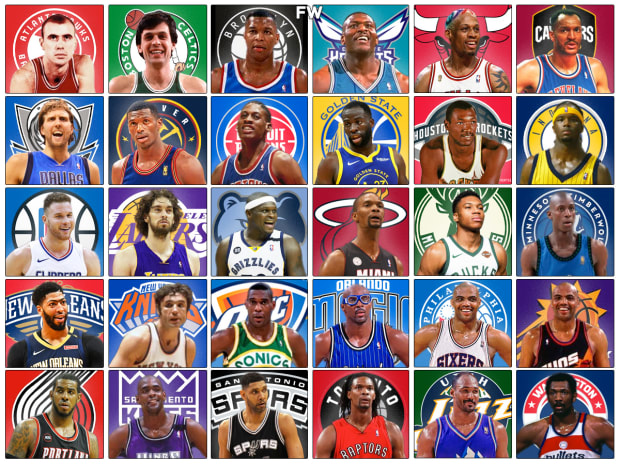
View the original article to see embedded media.
For the past 75 years, some of the greatest basketball players to ever play in the NBA have played the power forward position. Power forwards use their size, skill, and strength to control games from the paint or even a bit further out. They are among the best rebounders in the game and best interior defenders as well. Some power forwards have even been known to stretch their games out to the perimeter on both offense and defense making them a priceless piece to a championship team.
When the NBA named their Top 75 players earlier this year, 14 of them primarily played the power forward position. 7 different power forwards have been named MVP while 4 of them have been named MVP more than once. 3 of those power forwards that have won an MVP during the regular season have also gone on to win a Finals MVP. Power forwards throughout history have provided us with some of the most iconic moments in NBA history. Today, we celebrate those power forwards who represented their respective franchises with honor and greatness.
These are the greatest power forwards from every NBA franchise.
Atlanta Hawks - Bob Pettit
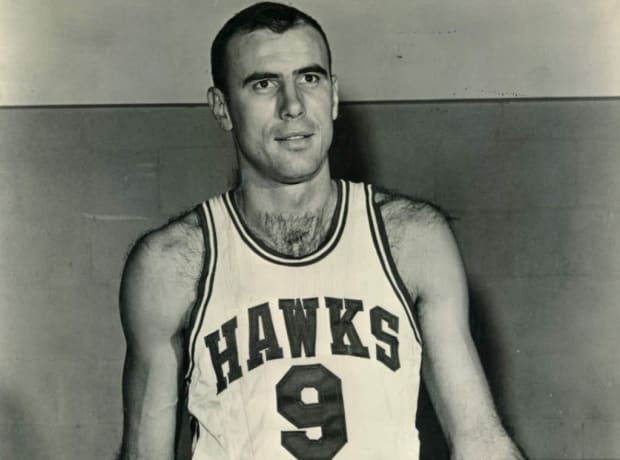
Career Stats (with Hawks): 26.4 PPG, 16.2 RPG, 3.0 APG
Career Achievements (with Hawks): 2x MVP, 1x Rookie Of The Year, 11x All-Star, 4x All-Star Game MVP, 11x All-NBA Team Selection
For his time, Bob Pettit was considered an elite athlete. He was great off of the dribble and could knock down outside shots. He was a ruthless offensive rebounder, constantly fighting for position on every possession. Pettit could also finish around the basket, making his rebounding tendencies all that more dangerous. His career lasted just 11 seasons but in those 11 seasons, Pettit cemented himself as an all-time great.
From the moment Bob Pettit made his NBA debut, he dominated. He took home Rookie Of The Year in 1954-55 averaging 20.4 PPG and 13.8 RPG. The following season, he led the NBA in scoring with 25.7 PPG and took home the MVP award as well. Two years later, Pettit led the Hawks to their only NBA championship in franchise history. In the finals, Pettit averaged 29.3 PPG and 17.0 RPG as the Hawks took down the Celtics in 6 games. Pettit would add on another scoring title and MVP award in 1958-59 and is still the only Player in Hawks history to win an MVP award and a Championship.
Boston Celtics - Kevin McHale
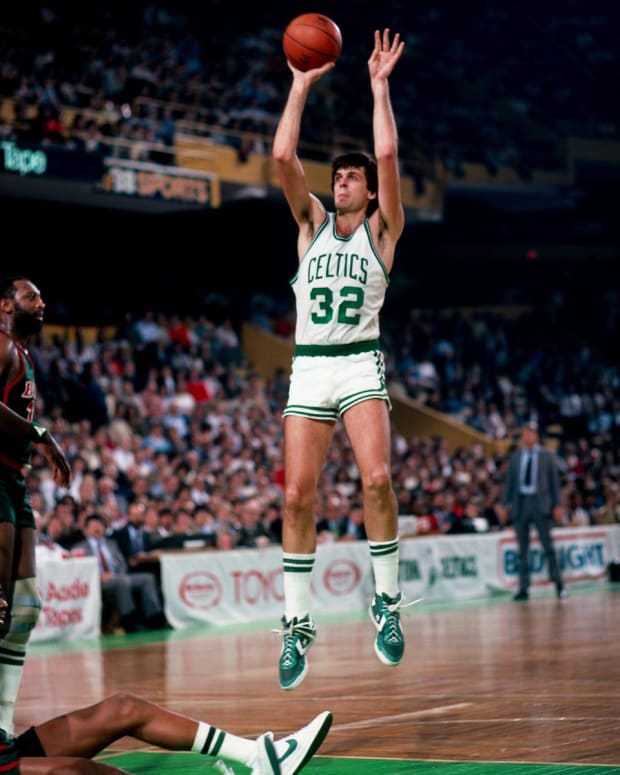
Career Stats (with Celtics): 17.9 PPG, 7.3 RPG, 1.7 APG, 0.4 SPG, 1.7 BPG
Career Achievements (with Celtics): 2x Sixth Man Of The Year, 7x All-Star, 1x All-NBA Team Selection, 6x All-Defensive Team Selection
Kevin McHale began his career as one of the league’s best players off of the bench. By the end of his career, he was considered one of the premier forwards in basketball. McHale was an athletic forward for the Celtics during the 80s who was a nightmare for opponents on both offense and defense. The reason for this was his legendary footwork. Once McHale made the catch in the paint, there was nearly no man who could contain him or stop him from scoring, just ask Charles Barkley.
McHale is one of 4 players in history to take home more than one Sixth Man Of The Year award, winning them in back-to-back seasons in 1984 and 1985. He, Robert Parish, and Larry Bird became one of the best front lines the NBA has ever seen to the tune of 3 championships by the end of 1986. In the Celtics’ third and final championship of the decade, McHale shined bright during the NBA Finals. He averaged 25.9 PPG, 8.5 RPG, and 2.5 BPG in 7 games to lead the Celtics in scoring and blocks for the series. As one of the best offensive and defensive players to ever grace the power forward position, McHale is assuredly Boston’s choice for this list.
Brooklyn Nets - Derrick Coleman
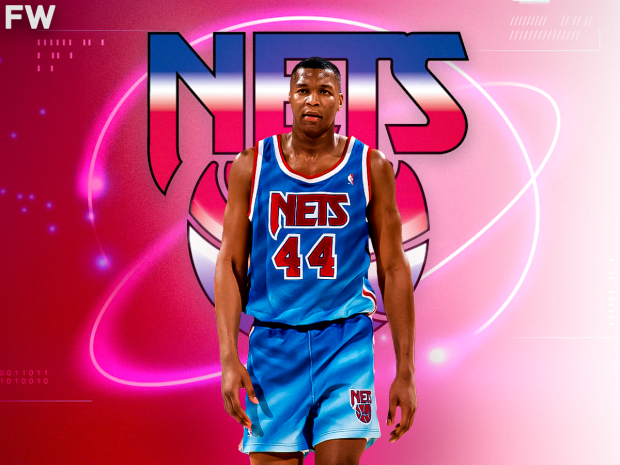
Career Stats (with Nets): 19.9 PPG, 10.6 RPG, 3.1 APG, 0.9 SPG, 1.6 BPG
Career Achievements (with Nets): 1x Rookie Of The Year, 1x All-Star, 2x All-NBA Team Selection
Derrick Coleman was supposed to be one of the premier big men of the 1990s. His career certainly started that way. He became an elite offensive weapon with his ability to bully other bigs in the paint but also step out and knock down medium to long-range shots. He was as slick as they come in the post but also could handle the ball and get by defenders, something that was extremely rare for big men in the 90s.
Coleman would storm onto the scene, taking home the Rookie of the Year award in 1991. He averaged 18.4 PPG and 10.3 RPG in 74 games for the Nets to cement his selection as the league’s best rookie. Then from 1993 through 1995, Coleman put up 3 straight seasons of 20.0 PPG or better and was selected to his first and only All-Star Game in 1994. He also earned back-to-back All-NBA Third Team selections in 1993 and 1994. The Nets went to the playoffs three times in 5 seasons with Coleman but never went further than the first round.
Charlotte Hornets - Larry Johnson
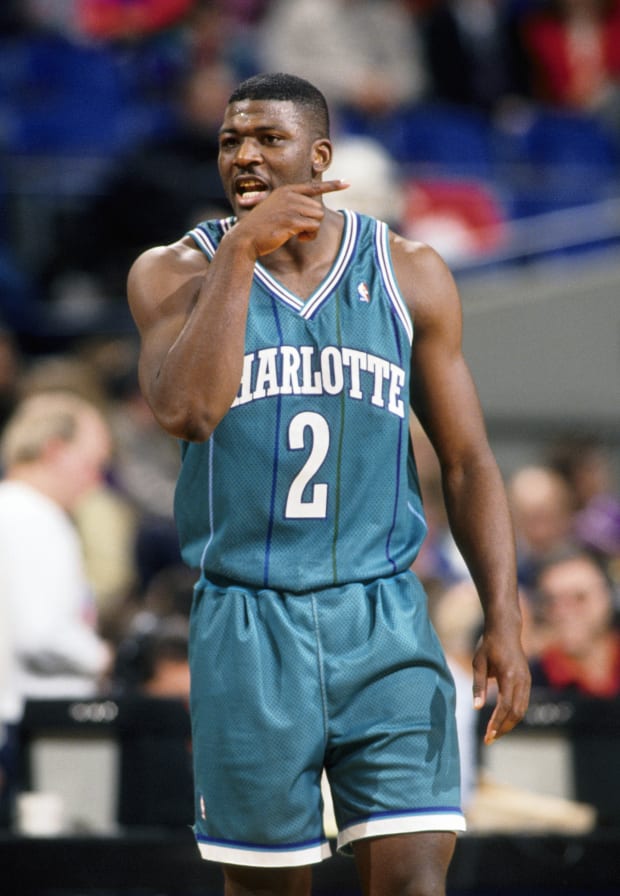
Credit: USA Today Sports
Career Stats (with Hornets): 19.6 PPG, 9.2 RPG, 4.1 APG, 0.8 SPG, 0.4 BPG
Career Achievements (with Hornets): 1x Rookie Of The Year, 2x All-Star, 1x All-NBA Team Selection
Expectations were astronomical for Larry Johnson coming out of UNLV, and rightfully so. He was the Hornets’ first-ever No. 1 overall draft pick and it seemed right from the start that he was the right choice. It didn’t take long for Johnson to show his value as he took home Rookie of the Year behind 19.2 PPG and 11.0 RPG on 49.0% shooting. Things were just getting started in Charlotte and Larry Johnson was at the center of it.
Johnson’s second season was special. He was selected as an All-Star for the first time and it marked the first time that any Hornets player had been chosen. He was selected to the All-NBA Second Team as well behind 22.1 PPG and 10.5 RPG on 52.6% shooting. He led the Hornets to the playoffs and a first-round victory over the Boston Celtics. He would be named an All-Star again in 1995 and it would be the last time he would see the playoffs with Charlotte. Even when the Hornets weren’t great as a team, Johnson had fans lined up every night to see him play.
Chicago Bulls - Dennis Rodman
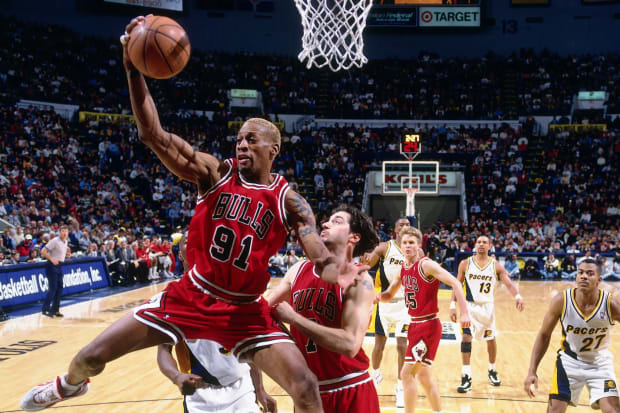
Credit: NBAE via Getty Images
Career Stats (with Bulls): 5.2 PPG, 15.3 RPG, 2.2 APG, 0.6 SPG, 0.4 BPG
Career Achievements (with Bulls): 1x All-Defensive Team Selection
Don’t let the lack of accolades distract you from just how valuable Dennis Rodman was to the Chicago Bulls from 1995 to 1998. Rodman was one of the best defenders and rebounders in the NBA at the time and of any era. During all three seasons that he was with the Chicago Bulls, Rodman led the NBA in rebounds, averaging over 15.0 RPG in his 3 years there. Not to mention that he didn’t mind going toe-to-toe with the likes of Karl Malone, Shaquille O'Neal, Hakeem Olajuwon, and so on.
Rodman wasn’t on the team to be a scorer, the Bulls already had plenty of that. He was there to grab rebounds, snatch loose balls, and deliver the edge that the Bulls needed to be so dominant. In his 3 playoff runs with the Bulls, Rodman averaged 11.3 RPG and in the Finals, it was 10.2 RPG. Rodman wasn’t going to instill fear on the offensive end. He never averaged more than 7.0 PPG for Chicago. No one could defend and rebound like him though and his role in 3 straight NBA titles should never be diminished.
Cleveland Cavaliers - Larry Nance
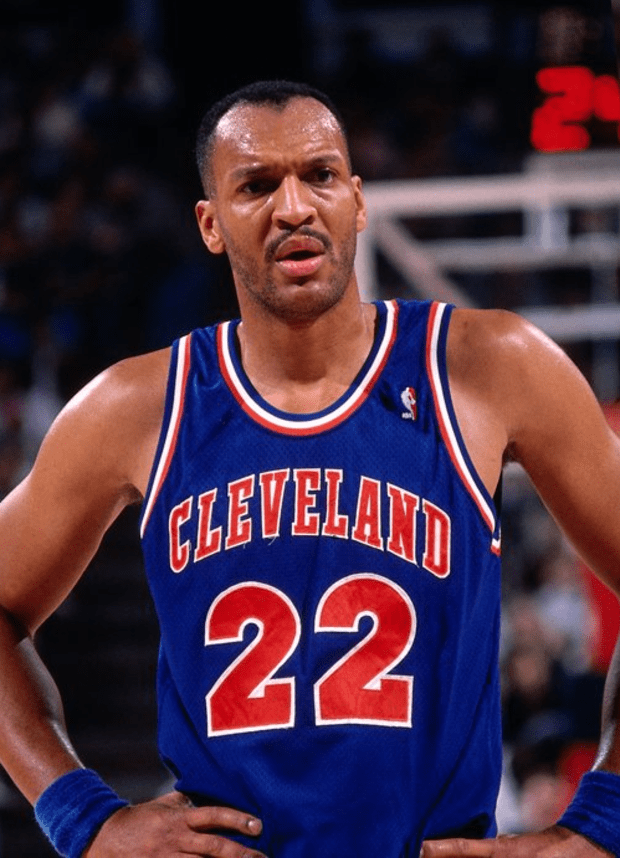
Credit: Slam Online/Twitter
Career Stats (with Cavaliers): 16.8 PPG, 8.2 RPG, 2.6 APG, 0.8 SPG, 2.5 BPG
Career Achievements (with Cavaliers): 2x All-Star, 3x All-Defensive Team Selection
If you didn’t know anything about former Cavs forward Larry Nance, it would only take about 5 minutes of film to understand his impact. Nance was an athlete’s athlete who could leap with the all-time greats of the game. Nance also emerged as a premier shot-blocker with the Cavaliers during their successful late 80s and early 90s seasons. For his career, Nance ranks 20th all-time in BPG and he was selected to 3 All-Defensive Teams with Cleveland for his efforts.
Even further on Nance’s shot-blocking ability, at the time of his retirement, he was the No. 1 player in league history in blocks that didn’t play center. He feasted on coming from the weak side to help the defender who had seemingly been beaten. As it stands right now, Nance ranks 3rd all-time in Cavs history in blocks and 9th in rebounds. Had it not been for the trade from Phoenix in 1988, the Cavaliers would not have been competing for Conference and NBA titles.
Dallas Mavericks - Dirk Nowitzki
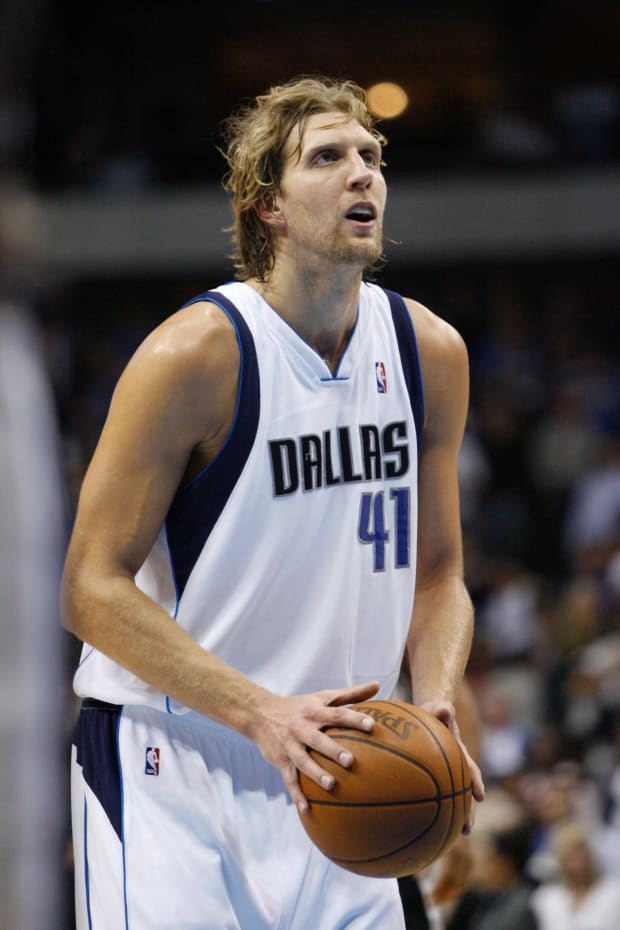
Credit: Jim Cowsert-USA TODAY Sports
Career Stats (with Mavericks): 20.7 PPG, 7.5 RPG, 2.4 APG, 0.8 SPG, 0.8 BPG
Career Achievements (with Mavericks): 1x MVP, 1x Finals MVP, 14x All-Star, 12x All-NBA Team Selection
Dirk Nowitzki is not only the greatest power forward and player in Mavs history, but he’s also one of the greatest to ever play the game. As it stands, he is the best shooter for a player over 7 feet tall and it didn’t matter where he was shooting from, it was automatic. Acquired by Dallas on draft night, Dirk had many questions about his game. Was he too skinny? Did he have what it takes to handle the NBA workload coming from Germany? Was he too perimeter-oriented for a player at his position? Over the next 20 years, Dirk answered all of those questions emphatically.
By 2007, Dirk was one of the best players in the world. He won the 2006-07 MVP award after leading the Mavs to 67 regular-season wins. The one thing about Dirk that was highly criticized was his inability to elevate his game and his team in the playoffs. That is until he delivered the franchise their first NBA title in 2011. He defeated the Kevin Durant-led Thunder, the 2-time defending champion Lakers, and the newly formed Miami Heat Big 3 en route to the championship and Finals MVP. He retired as Dallas's all-time leader in points, rebounds, blocks, and field goals made among many other records as well.
Denver Nuggets - Antonio McDyess
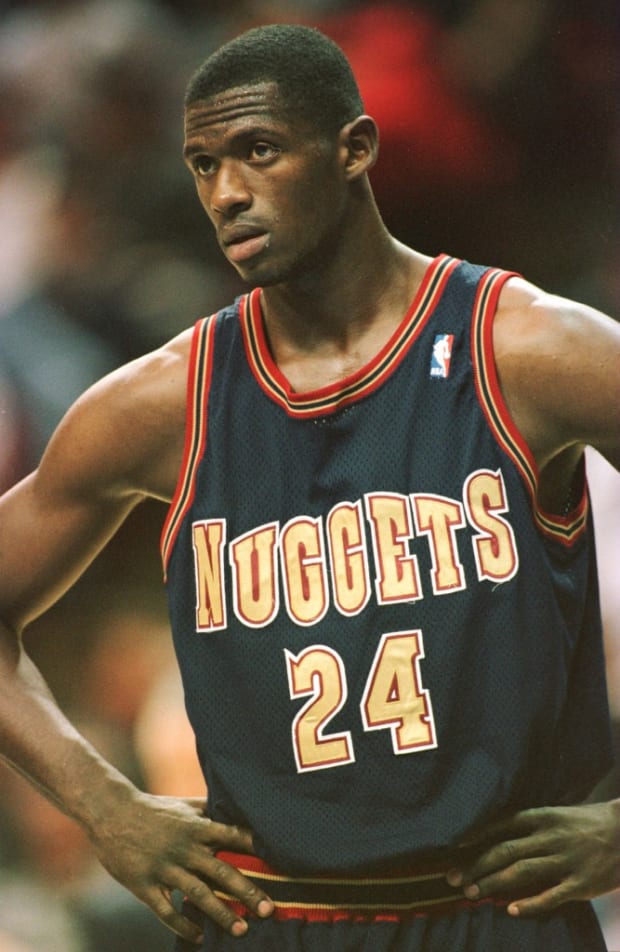
Career Stats (with Nuggets): 18.2 PPG, 9.0 RPG, 1.6 APG, 0.9 SPG, 1.7 BPG
Career Achievements (with Nuggets): 1x All-Star, 1x All-NBA Team Selection
Antonio McDyess was truly an elite athlete for a player his size. He was explosive, especially around the basket where he would finish with emphatic power. He was a productive offensive player, especially on the low-block where he could score and rebound among the best in the NBA at the time. He also brought an elite mid-range game which allowed Denver to spread the floor more than most teams in that era.
Before he injured his knees, McDyess was well on his way to being a consistent 20.0 PPG and 10,0 RPG threat every night. In the 1998-99 season, McDyess averaged 21.2 PPG and 10.7 RPG for a Nuggets team that only won 14 games. He was also named to the All-NBA Third Team for the only time in his career. Two years later in 2001, McDyess was named an All-Star for the only time in his career averaging 20.8 PPG and 12.1 RPG on the season. The Nuggets never made the playoffs during McDyess' tenure but that doesn't take away from what he brought to the franchise.
Detroit Pistons - Dennis Rodman
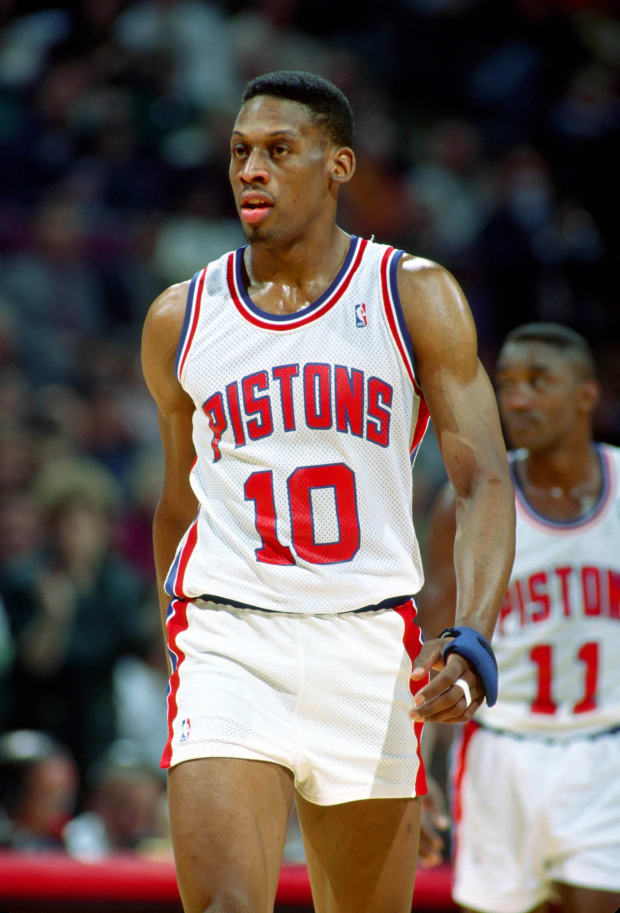
Credit: RVR Photos-USA TODAY Sports
Career Stats (with Pistons): 8.8 PPG, 11.5 RPG, 1.3 APG, 0.7 SPG, 0.7 BPG
Career Achievements (with Pistons): 2x Defensive Player Of The Year, 2x All-Star, 1x All-NBA Team Selection, 5x All-Defensive Team Selection
More than he was with the Chicago Bulls, Dennis Rodman was one of the most elite defenders in the NBA during his time with the Pistons. He had a motor that never stopped with a ruthless thirst for taking on the toughest defensive assignments every single night. He personified everything about the Detroit Pistons during his time there and it resulted in 2 Defensive Player Of The Year awards and 2 championships.
What separated Rodman from any other Pistons legend though was his energy and determination on the court. He never stopped moving whether he was picking up an opponent on defense, chasing down a loose ball, or fighting for a rebound. For his defensive versatility, Rodman was awarded Defensive Player Of The Year in 1990 and 1991. Rodman thrived on having a non-offensive role with the Pistons. It gave him the chance to do what he loved most which was being a menace to opponents on both ends of the floor.
Golden State Warriors - Draymond Green
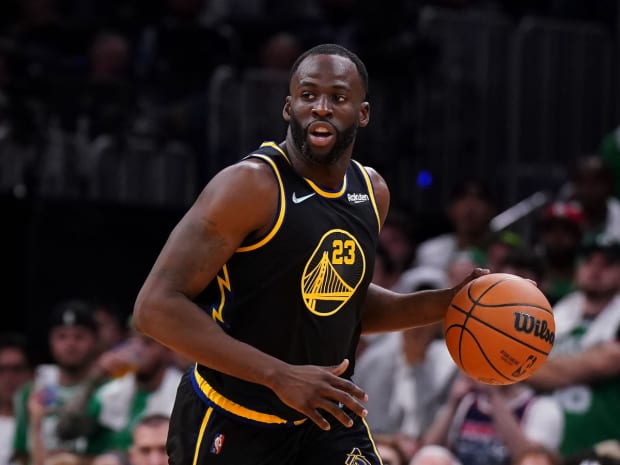
Credit: David Butler II/USA Today Sports
Career Stats (with Warriors): 8.7 PPG, 6.9 RPG, 5.4 APG, 1.4 SPG, 1.0 BPG
Career Achievements (with Warriors): 1x Defensive Player Of The Year, 3x All-Star, 2x All-NBA Team Selection, 7x All-Defensive Team Selection
Draymond Green’s contributions to the success of the Golden State Warriors are priceless. He is the engine that makes the franchise go and without him on the floor, they look lost most nights. He is the playmaker that sets everything up on offense. Yes, even more than Stephen Curry because Green is there slowing things down and letting things open up while directing his teammates at the same time. On defense, he is like the conductor of an orchestra, moving his teammates around and yelling out assignments. Green himself will be taking on the challenge of an opposing team’s best player, whether that be on the perimeter or interior.
Green has been one of the main driving forces behind 4 Golden State championships in the past 8 years. He made 3 straight All-Star games from 2016 to 2018 and landed back-to-back NBA titles in the process. In 2017, he was named the NBA’s Defensive Player Of The Year when he led the league in steals with 2.0 SPG and the Warriors won 67 games. If Stephen Curry is the Heart of the Warriors, there is no doubt that Green is everything else as the team’s primary playmaker and defender.
Houston Rockets - Elvin Hayes
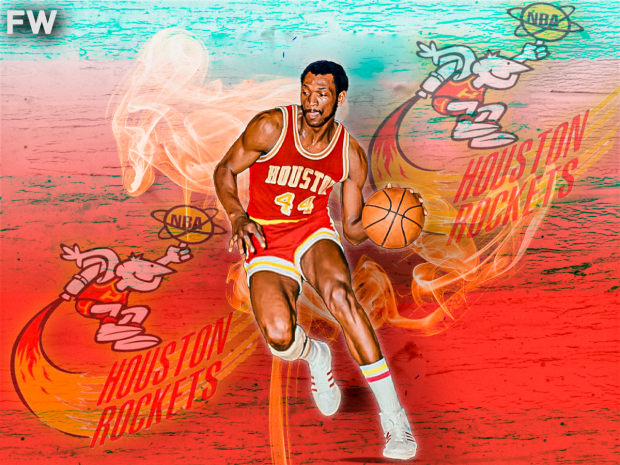
Career Stats (with Rockets): 20.6 PPG, 12.2 RPG, 1.9 APG, 0.5 SPG, 0.9 BPG
Career Achievements (with Rockets): 4x All-Star
Before he was a staple and an all-time Washington Bullets great, Elvin Hayes spent 4 very productive seasons with the Rockets. Hayes began his legendary career for the Rockets when they still called San Diego home. He used his trademark jumper to rack up points on the offensive end while also locking down opponents with his stellar interior defense. He had one of the greatest rookie seasons ever in a Rockets uniform and is still considered far and away their best power forward of all time.
In Hayes’ rookie season, he took home the scoring title with 28.4 PPG and added 17.1 RPG. He wasn’t able to take home Rookie Of The Year honors that season due to MVP Wes Unseld’s stellar year with Washington. The following season, Hayes finished 3rd in the league in scoring and led the league in rebounding with 16.9 RPG. In his first 4 seasons with the Rockets, Hayes never averaged less than 25.0 PPG and 14.0 RPG. After 8 seasons with Washington at the peak of his career, Hayes returned to Houston to finish his career where he started.
Indiana Pacers - Jermaine O’Neal
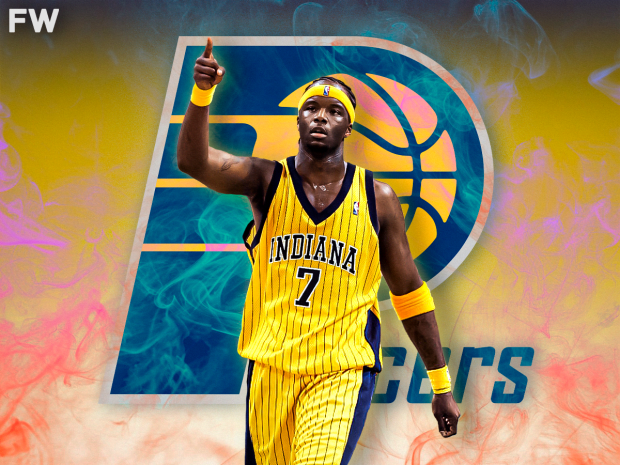
Career Stats (with Pacers): 18.6 PPG, 9.6 RPG, 2.0 APG, 0.7 SPG, 2.4 BPG
Career Achievements (with Pacers): 1x Most Improved Player, 6x All-Star, 3x All-NBA Team Selection
It is sad that sometimes it goes forgotten or misrepresented just how good Jermaine O’Neal was with the Pacers. After a short stint with the Trail Blazers, O’Neal began his run with the Indiana Pacers in the 2001-02 season. By the end of 2002, O’Neal was beginning a scratch as one of the best bigs in the NBA. He was awarded the 2001-02 Most Improved Player award when he ballooned his stats up to 19.0 PPG, 10.5 RPG, and 2.3 BPG. He was elected an All-Star that season and the Pacers won 42 games.
The next 5 seasons were the best 5-year stretch by any big in Pacers history. He averaged better than 20.0 PPG and 2.0 BPG in each season while leading the Pacers to the playoffs every year up to 2006. In the 2003-04 season, O’Neal finished 3rd in MVP voting behind only Tim Duncan and Kevin Garnett. He averaged 20.1 PPG, 10.0 RPG, and 2.6 BPG and led the Pacers to the Eastern Conference Finals. In his 6 years in Indiana, O’Neal was a consensus Top 10 player in the NBA and Top 3 at his position, something no other Pacers power forward can claim to.
Los Angeles Clippers - Blake Griffin

Credit: Getty Images
Career Stats (with Clippers): 21.6 PPG, 9.3 RPG, 4.2 APG, 1.0 SPG, 0.5 BPG
Career Achievements (with Clippers): 1x Rookie Of The Year, 5x All-Star, 4x All-NBA Team Selection
Blake Griffin was set to be a star from the moment the Los Angeles Clippers drafted him in 2009. He became just that while turning around a franchise that had been one of the worst in basketball in terms of on-the-court success. Griffin made the Clippers must-watch basketball with his highlight reel athleticism and knack for putting defenders on posters. Griffin helped the Clippers make the playoffs in 6 out of his 8 seasons with the team but never advanced past the 2nd round.
In the 2010-11 season, Griffin was still eligible as an NBA rookie. He would win Rookie Of The Year behind 22.5 PPG and 12.1 RPG on 50.6% shooting. He made his first of 5 straight All-Star Game appearances as well. In 2014, Blake finished 3rd in MVP voting behind Kevin Durant and LeBron James. Blake averaged 24.1 PPG and 9.5 RPG on 52.8% shooting and led the Clippers to 57 wins, a franchise record. The Clippers reached new heights when Blake Griffin arrived and for that, he is their greatest power forward.
Los Angeles Lakers - Pau Gasol
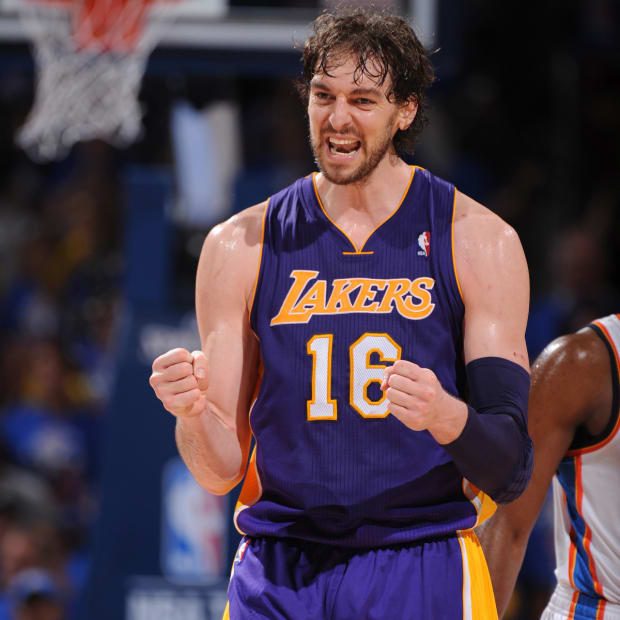
Credit: Sports Illustrated
Career Stats (with Lakers): 17.7 PPG, 9.9 RPG, 3.5 APG, 0.6 SPG, 1.4 BPG
Career Achievements (with Lakers): 3x All-Star, 3x All-NBA Team Selection
Pau Gasol spent 6 and a half seasons with the Lakers during the early 2010s. During that time, he became one of the best big men to ever wear their uniform, putting him in elite company. Pau was the perfect offensively versatile weapon. He had a low-post game that could hardly be stopped with his soft touch and length. He was also just as effective from the high-post where he could knock down an easy jumper or pick defenses apart with his passing.
Pau made the Lakers serious title threats from the moment he was acquired from the Memphis Grizzlies. He was traded to the Lakers midway through the 2007-08 season. The Lakers advanced to the NBA Finals where they were defeated by the Boston Celtics. The following two seasons would be different as Pau, alongside Kobe Bryant, led the Lakers to back-to-back championships in 2009 and 2010. The Lakers are set to hang Gasol’s jersey from the rafters in 2022-23 and they should proclaim him the best power forward in team history.
Memphis Grizzlies - Zach Randolph
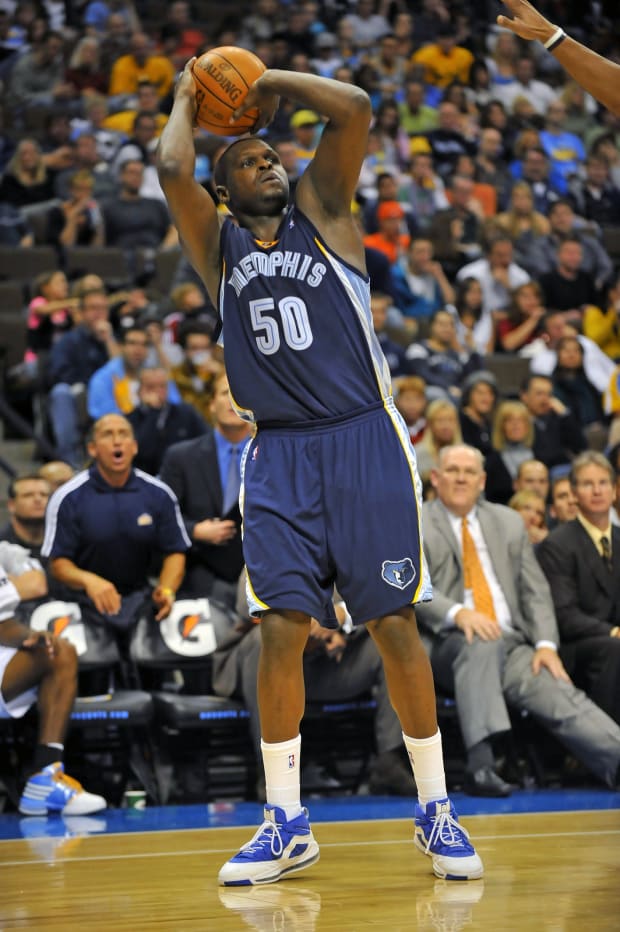
Credit: Ron Chenoy-USA TODAY Sports
Career Stats (with Grizzlies): 16.8 PPG, 10.2 RPG, 2.0 APG, 0.8 SPG, 0.3 BPG
Career Achievements (with Grizzlies): 2x All-Star, 1x All-NBA Team Selection
It can not be understated how much Zach Randolph means to the City Of Memphis and the Grizzlies organization. With his unique style of bully-ball and finesse, Randolph led the Grizzlies to the highest heights the franchise has ever seen. With big moment after big moment, Randolph became a fan favorite and one of the most feared big men in the league.
Randolph immediately became an All-Star when he signed with Memphis in 2009. He averaged 20.8 PPG and 11.7 RPG in 2009-10 but Memphis fell just short of the playoffs. In 2013, Randolph had another All-Star season and this time, the Grizzlies made some noise in the playoffs. Randolph led Memphis to the Western Conference Finals for the first time in franchise history before being swept by the Spurs. This included a dismantling of the Durant-led Thunder in the second round by Randolph. He became the first player in franchise history to have their jersey retired by the Grizzlies which speaks volumes about his impact on the team.
Miami Heat - Chris Bosh
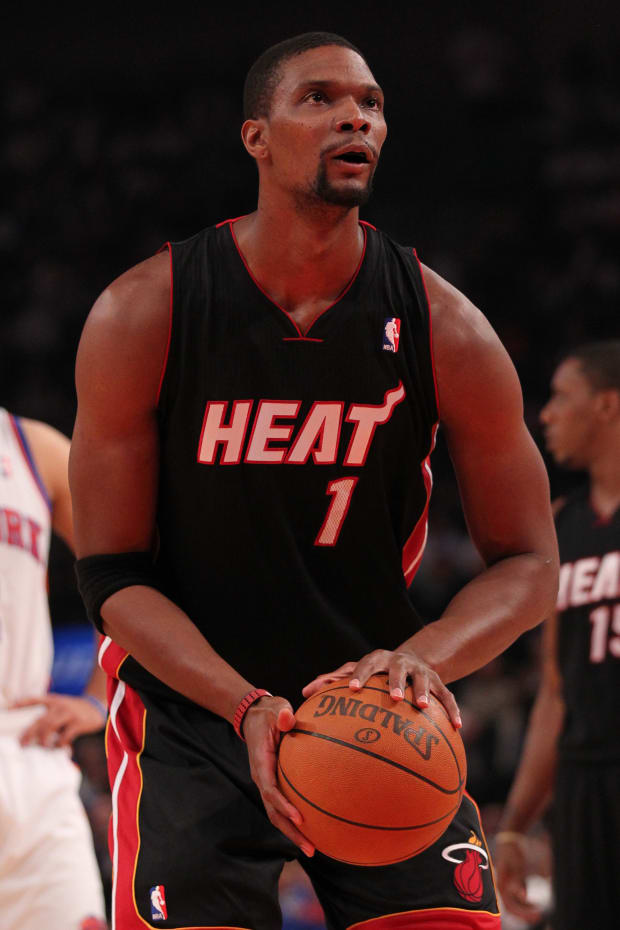
Credit: Anthony Gruppuso-USA TODAY Sports
Career Stats (with Heat): 18.0 PPG, 7.3 RPG, 1.8 APG, 0.9 SPG, 0.9 BPG
Career Achievements (with Heat): 6x All-Star
Coming from Toronto where he was the No. 1 guy, Chris Bosh had to completely reinvent himself with the Heat. He had no problem taking a back seat to LeBron James and Dwyane Wade which resulted in 2 NBA championships for Bosh and Miami. Bosh and the Heat went to the NBA Finals 4 straight years after he and LeBron James joined just before the 2010-11 season. Bosh took on the role of a true scratch power forward who was accustomed to knocking down mid to long-range shots while still being able to fight his way inside.
Over the 4 years that Miami went to the Finals, Bosh averaged 17.3 PPG and 7.3 RPG in the regular season. During the playoffs, he averaged 14.9 PPG and 7.3 RPG on the same stretch. Bosh ended up playing 23 NBA Finals games for the Heat and averaged 14.7 PPG and 7.8 RPG on 45.9% shooting. His willingness to sacrifice his gain so that his teams could win championships lands him as the Miami Heat’s greatest power forward.
Milwaukee Bucks - Giannis Antetokounmpo
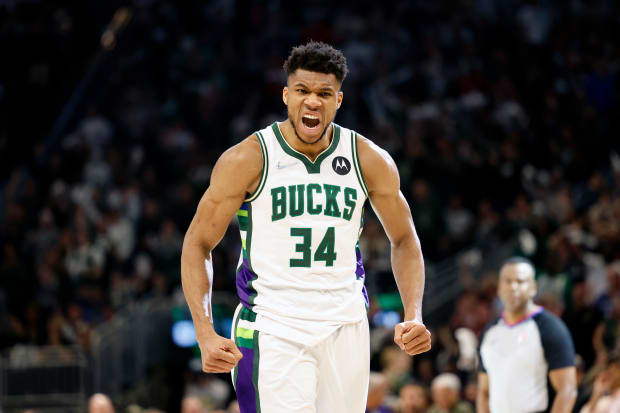
Credit: Jeff Hanisch-USA TODAY Sports
Career Stats (with Bucks): 21.8 PPG, 9.4 RPG, 4.6 APG, 1.2 SPG, 1.2 BPG
Career Achievements (with Bucks): 2x MVP, 1x Finals MVP, 1x Defensive Player Of The Year, 1x Most Improved Player, 6x All-Star, 1x All-Star Game MVP, 6x All-NBA Team Selection, 5x All-Defensive Team Selection
Since 2014, we have watched Giannis Antetokounmpo transform from a skinny kid out of Greece into the best and most dominant player in the NBA. Since 2017, Giannis has emerged and staked his claim as the consensus best player in the world with his gameplan shattering defense and his unstoppable offensive game. He helped deliver the Bucks their first title in 50 years and is already well on his way to becoming the best player in Bucks history.
From the moment Giannis became an All-Star in 2017 and won Most Improved Player, it has been a meteoric rise to the top. He took home his first MVP award in 2019 and the following season, won it again as well as Defensive Player Of The Year. The 2021 season would be where his proudest moment came with the Bucks. Giannis led the team to their first Finals since 1971 and delivered the city the championship he told them was coming. After suffering a knee injury in the previous round, it looked like Giannis would be hobbled the whole way and the Bucks dropped the first 2 games of the Finals. Giannis would not be denied as he led the Bucks to 4 straight wins including 50 points in Game 6 to close out the series. Giannis would take home Finals MVP behind 35.2 PPG, 13.2 RPG, 5.0 APG, and 1.8 BPG.
Minnesota Timberwolves - Kevin Garnett
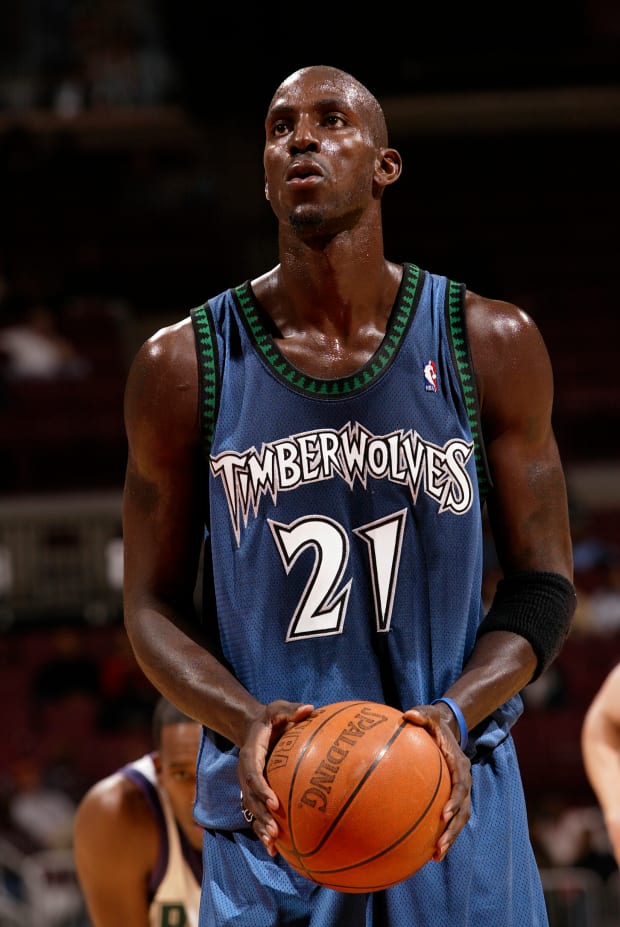
Credit: Joe Robbins-USA TODAY Sports
Career Stats (with Timberwolves): 19.8 PPG, 11.0 RPG, 4.3 APG, 1.4 SPG, 1.6 BPG
Career Achievements (with Timberwolves): 1x MVP, 10x All-Star, 1x All-Star Game MVP, 8x All-NBA Team Selection, 8x All-Defensive Team Selection
Kevin Garnett is one of the best two-way power forwards ever. He was a versatile scoring big on offense who battled in the post and could knock down outside shots. On defense, he was an elite rim protector who had no problem picking up switches and locking opponents down on the perimeter. Garnett is not only Minnesota’s greatest power forward but he is their greatest player as their only player to ever win MVP and take the team to the Western Conference Finals.
From 1999 to his last season with Minnesota in 2007, Garnett was one of the best players in basketball and a consistent 20.0 PPG and 10.0 RPG threat. During this stretch, he led the league in rebounding 4 times and took home an MVP in 2003-04. He averaged 24.2 PPG, 13.9 RPG, and 2.2 BPG that season and took Minnesota further than ever before, to the Western Conference Finals. Garnett is still the Timberwolves' all-time leader in points, rebounds, assists, steals, blocks, and made field goals.
New Orleans Pelicans - Anthony Davis
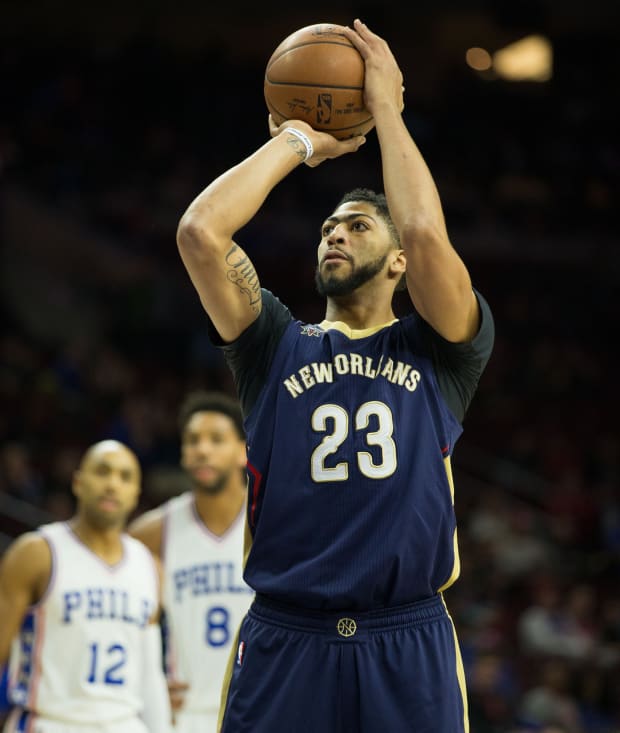
Credit: Bill Streicher-USA TODAY Sports
Career Stats (with Pelicans): 23.7 PPG, 10.5 RPG, 2.1 APG, 1.4 SPG, 2.4 BPG
Career Achievements (with Pelicans): 6x All-Star, 1x All-Star Game MVP, 3x All-NBA Team Selection, 3x All-Defensive Team Selection
At his peak with the New Orleans Pelicans, Anthony Davis was considered the best two-way big man in basketball. He had elite defensive skills, keeping his man in font and possessing an uncanny ability to alter and deflect shots. On offense, he was even more deadly. He could step out and hit a shot from any spot, he could take his defender off the dribble for a drive and flush, and he was the best lob threat in basketball. He was a consistent MVP candidate in New Orleans, something they have never had before or since.
Every year aside from his rookie year in New Orleans, Anthony Davis was an All-Star. He led the league in blocks per game 3 times while averaging over 20.0 PPG 6 times. He averaged over 25.0 PPG in a season during the final 3 seasons with the team. In 2014-15, Davis finished 5th in MVP voting, and in 2017-18 he finished 3rd. His 2017-18 stats were 28.1 PPG, 11.1 RPG, and a league-leading 2.6 BPG. He had officially arrived as the league’s potential next superstar. New Orleans traded David to the Lakers in 2019 where he would go on to win his first title.
New York Knicks - Dave DeBusschere
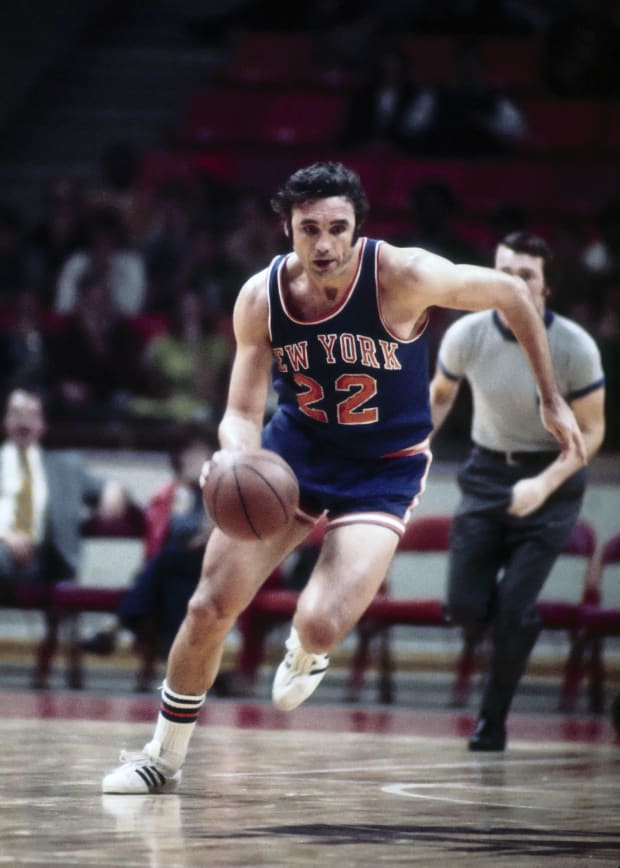
Credit: Manny Rubio-USA TODAY Sports
Career Stats (with Knicks): 16.0 PPG, 10.7 RPG, 3.1 APG, 0.9 SPG, 0.5 BPG
Career Achievements (with Knicks): 5x All-Star, 5x All-Defensive Team Selection
Dave DeBusschere was as hard-nosed and blue-collared as it gets during his playing days with the New York Knicks. He was known all too well for his defense and physical play, especially for anyone who came through the lane. With his high-level basketball IQ, DeBusschere’s arrival in New York was the piece they needed at the time and the catalyst for not one but two NBA championships in The Big Apple.
In the 1970 NBA Playoffs, DeBusschere averaged 16.1 PPG and 11.6 RPG to help the Knicks win the championship. It was DeBusschere’s efficient Game 7 and defense on Wilt Chamberlain that propelled the Knicks to victory. In 1973, DeBusschere and the Knicks found themselves back in the NBA Finals. This time, he averaged 15.6 PPG and 10.5 RPG and they took down the Lakers once more in 5 games. DeBusschere left his mark on New York basketball forever in those 6 seasons and is easily their greatest power forward of all time.
Oklahoma City Thunder/Seattle SuperSonics - Shawn Kemp
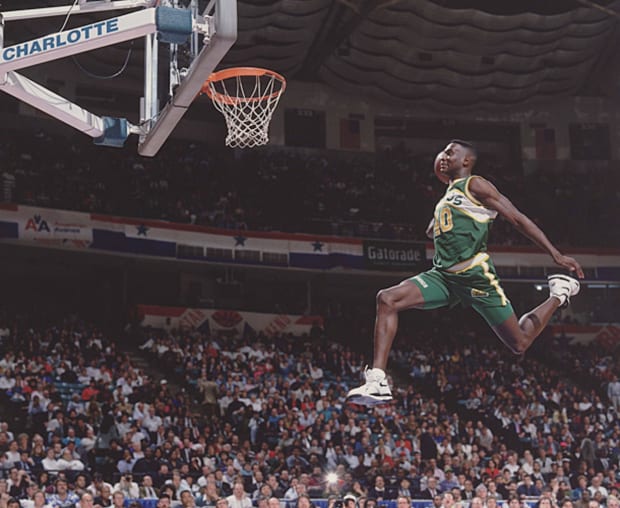
Credit: Andy Gray, Sports Illustrated
Career Stats (with SuperSonics): 16.2 PPG, 9.6 RPG, 1.8 APG, 1.2 SPG, 1.5 BPG
Career Achievements (with SuperSonics): 5x All-Star, 3x All-NBA Team Selection
During the 90s, Shawn Kemp was one of the most exciting players in the NBA. Kemp was a superhuman athlete who ran the floor with speed and precision but finished with raw power. Early on, he was considered mostly a powerful in-game dunker but by the end of his Seattle tenure, he was an integral part of championship-contending teams. From 1993 until his final year with the Sonics, Kemp was a consistent 16.0 PPG and 10.0 RPG threat who teams just could not stop most nights.
From 1991 through the 1997 season, Kemp averaged 17.7 PPG, 10.4 RPG, and 1.6 BPG. They made the playoffs every year and made some real noise in 1996. In the 96’ playoffs, Kemp averaged 20.9 PPG and 10.4 RPG as Seattle marched their way to the Finals. They ran into a buzzsaw known as the Chicago Bulls but Kemp battled Michael Jordan for the title of the best player on the floor. He averaged 23.3 PPG, 10.0 RPG, and 2.0 BPG in the 6-game series loss. Kemp may have never raised the Larry O’Brien trophy in Seattle but he is easily their greatest power forward.
Orlando Magic - Horace Grant
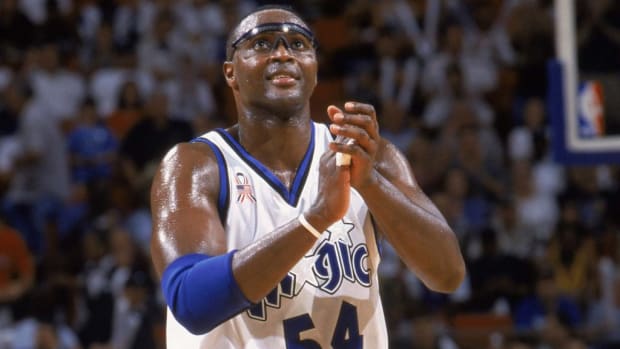
Credit: Fernando Medina/Getty Images/NBAE
Career Stats (with Magic): 11.3 PPG, 8.2 RPG, 2.1 APG, 1.0 SPG, 1.0 BPG
Career Achievements (with Magic): 2x All-Defensive Team Selection
Horace Grant was your typical power forward in the 1990s. He would be the prototypical perfect center in today’s game. He was a defensive menace using his lateral quickness and tenacity to frustrate opponents nightly. He would cover the most ground of anyone from those Orlando teams during the mid-90s, picking up opponents full-court and trying to force turnovers.
Grant was essential to the 1995 Magic team that reached the NBA Finals. He had no problem banging down low with the bigs of the 90s and easily ran the floor with the guards of the time as well. In the 95’ playoffs, Grant averaged 13.7 PPG, 10.4 RPG, 1.90 SPG, and 1.1 BPG en route to the Finals. He was a huge part of their instant success in the 90s and the perfect 3rd option alongside Shaquille O'Neal and Penny Hardaway.
Philadelphia 76ers - Charles Barkley
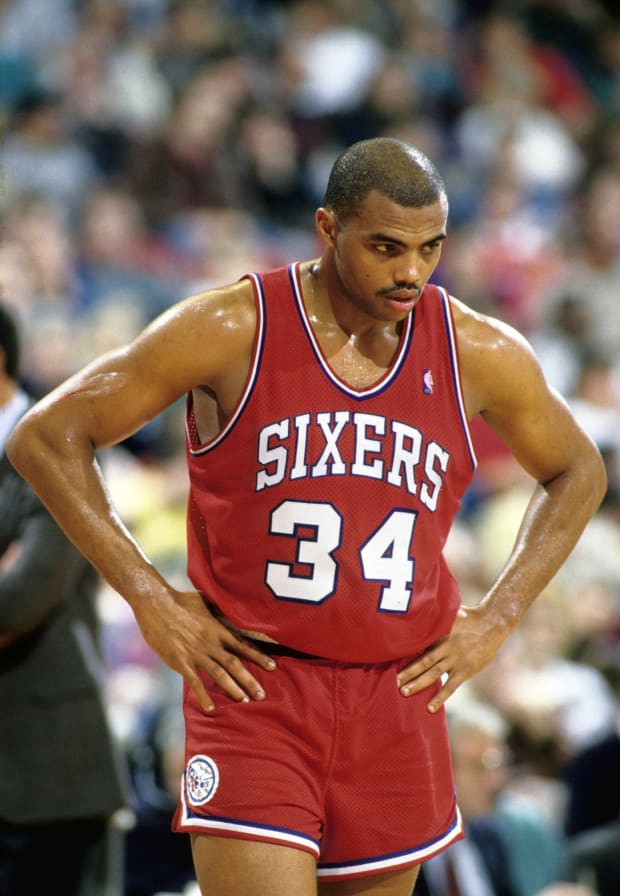
Credit: USA Today Sports
Career Stats (with 76ers): 23.3 PPG, 11.6 RPG, 3.7 APG, 1.7 SPG, 1.0 BPG
Career Achievements (with 76ers): 6x All-Star, 1x All-Star Game MVP, 7x All-NBA Team Selection
Headed into his career with the Philadelphia 76ers, Charles Barkley was highly scrutinized for his seemingly out-of-shape figure. When he finally hit the court, all doubts were erased. It wasn’t rare to see Barkley grab one of his many rebounds and charge down the court to run the fast break and finish on his own. In his first season with the team, he led them to the Eastern Conference Finals where they fell to the Boston Celtics. Unfortunately, that was as good as it got with Barkley in Philly.
From 1988 through 1991, Barkley made 4 straight All-NBA First Teams. Over that stretch, he averaged 26.7 PPG and 11.6 RPG on 58.4% shooting. In Philly, Barkley finished Top 10 in MVP 6 different times This included a 2nd place finish in 1990 when he averaged 25.2 PPG, 11.5 RPG, and 1.6 SPG and led the Sixers to 53 wins. There has never been a power forward for the Sixers franchise that could do the things Barkley did for the team.
Phoenix Suns - Charles Barkley
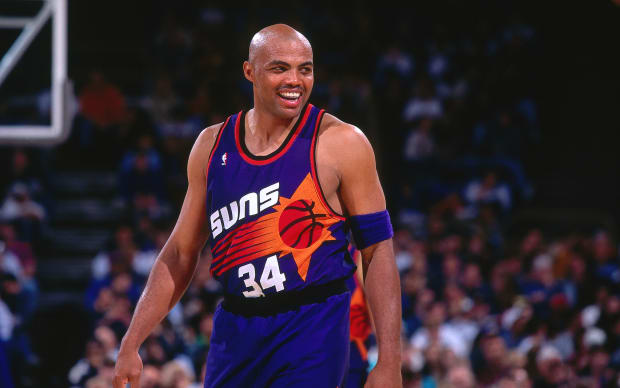
Credit: NBAE via Getty Images
Career Stats (with Suns): 23.4 PPG, 11.5 RPG, 4.4 APG, 1.6 SPG, 0.8 BPG
Career Achievements (with Suns): 1x MVP, 4x All-Star, 4x All-NBA Team Selection
After a series of disappointing seasons in Philly, Barkley wanted out and the Phoenix Suns obliged his request. Meanwhile, the Suns had reached a couple of Western Conference Finals before his arrival and needed Barkley as that final piece to get over the hump. In his very first season with the team, Barkley made the move worth it in just a few short months.
In his first season with the Suns, Barkley was named the MVP winner. He averaged 25.6 PPG, 12.2 RPG, and 5.1 APG on 52.0% shooting. The Suns won 62 games and eventually ran through the competition in the playoffs as well. Barkley averaged 26.6 PPG, 13.6 RPG, and 1.6 SPG to lead them to face off with the Chicago Bulls. They would eventually fall in 6 games but Barkley’s impact on the franchise was clear.
Portland Trail Blazers - LaMarcus Aldridge
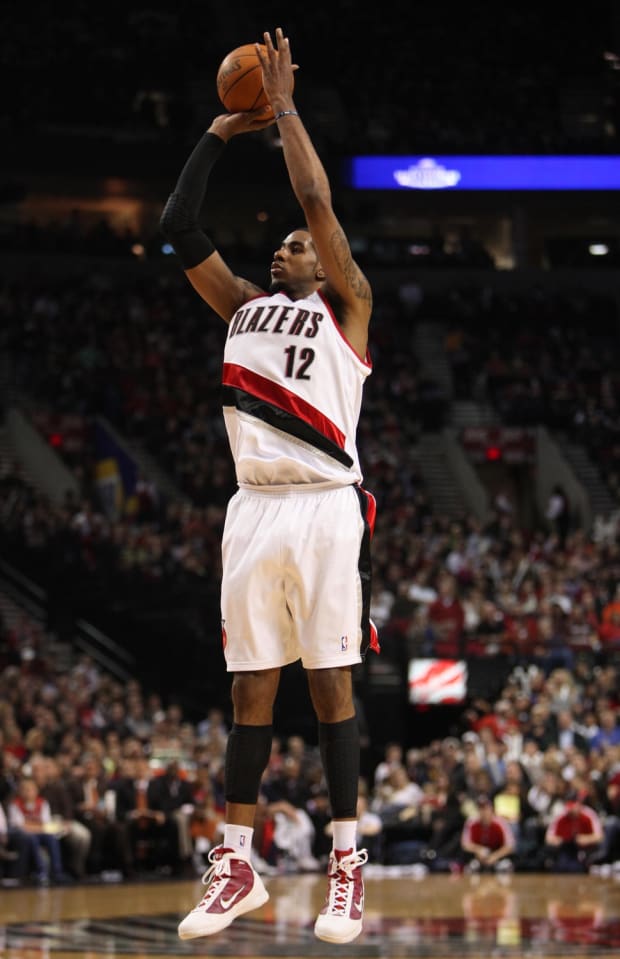
Credit: Craig Mitchelldyer-USA TODAY Sports
Career Stats (with Trail Blazers): 19.4 PPG, 8.4 RPG, 1.9 APG, 0.7 SPG, 1.1 BPG
Career Achievements (with Trail Blazers): 4x All-Star, 3x All-NBA Team Selection
There weren't many power forwards who had the versatile skill set that LaMarcus Aldridge did for the Trail Blazers in the 2010s. He did not depend on athleticism to be successful but rather his smooth and finesse game made him a tough match-up every night. It didn’t matter if it was the low or high-post, Aldridge was going to go to work and make you pay. He could knock down the short jumper or put the ball on the floor and embarrass you in the block. Whatever it took, he was going to get it done.
From 2011 through 2015, Aldridge averaged 22.2 PPG, 9.5 RPG, and 1.0 BPG. He had established himself as one of the best power forwards in the NBA and helped the Trail Blazers reach the 2nd round of the playoffs in 2014. As it stands right now, Aldridge is 1st in Trail Blazers history in rebounds, 3rd in blocks, and 3rd in points.
Sacramento Kings - Chris Webber
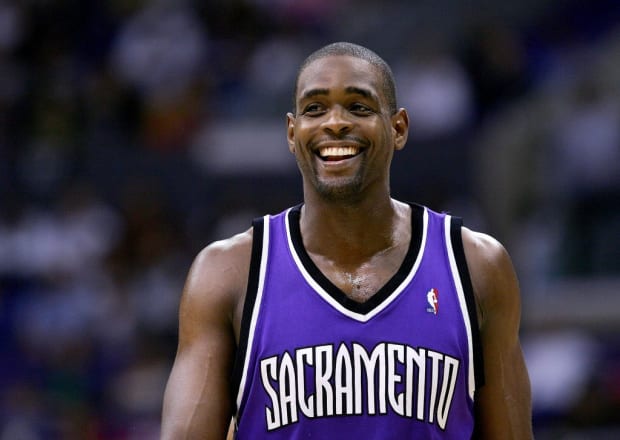
Credit: Lisa Blumenfeld/Getty Images
Career Stats (with Kings): 23.5 PPG, 10.6 RPG, 4.8 APG, 1.5 SPG, 1.5 BPG
Career Achievements (with Kings): 4x All-Star, 5x All-NBA Team Selection
As a power forward, Chris Webber was everything you could have wanted in the early and mid-2000s. He had no problem going to war on both ends in the post and he had no problem rebounding and scoring the ball from there either. He also did some other things that other power forwards just didn’t do at the time. He ran the floor extremely well for his size and it made him a transition nightmare. He also was the best passer at his position which made him a threat from the high-post, low-post, and on fast breaks. He also could knock down any shot within the three-point line without hesitation.
The 2000s Kings were legitimate NBA title contenders and Chris Webber was a big reason why. In his 4 straight All-Star seasons from 2000 to 2003, Webber averaged 24.8 PPG, 10.6 RPG, and 4.7 APG on 47.9% shooting. In 2002 and 2004, he led the Kings to their 2 deepest playoff runs. In 2002, he led them to the Western Conference Finals and in 2004, it was the second round. Chris Webber was a member of the last Kings team to make the playoffs at all. Getting them to the Western Conference Finals makes him the greatest power forward in team history among other things.
San Antonio Spurs - Tim Duncan
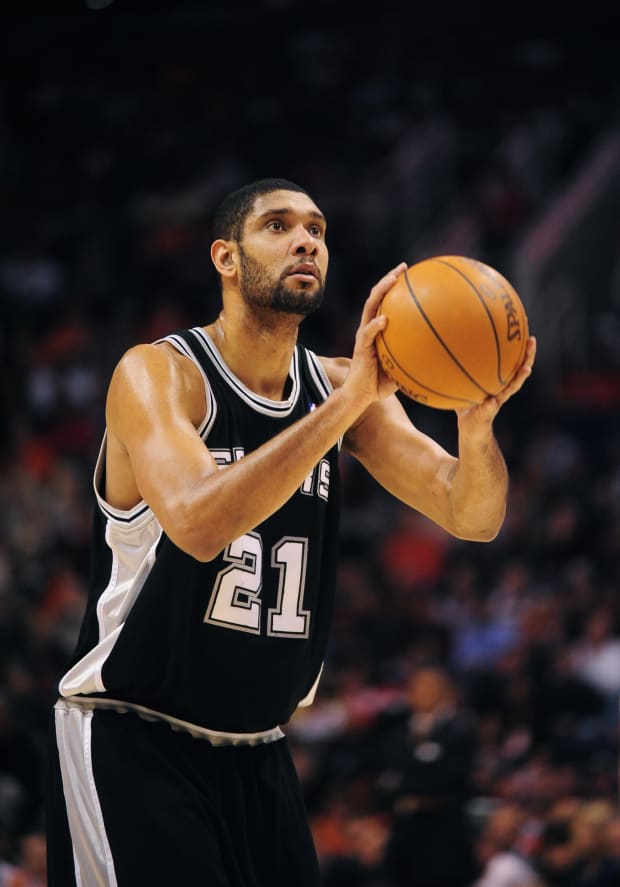
Credit: Mark J. Rebilas-USA TODAY Sports
Career Stats (with Spurs): 19.0 PPG, 10.8 RPG, 3.0 APG, 0.7 SPG, 2.2 BPG
Career Achievements (with Spurs): 2x MVP, 3x Finals MVP, 1x Rookie Of The Year, 15x All-Star, 1x All-Star Game MVP, 15x All-NBA Team Selection, 15x All-Defensive Team Selection
What is there to say about Tim Duncan that hasn’t already been said? He is the greatest power forward to ever play the game. He is a consummate winner whose impact perhaps may be the largest in NBA history. He took the Spurs from a consistent letdown to an absolute dynasty within 5 years of being in the NBA. He won a Finals MVP award in just his 2nd season in the pros. Tim Duncan may have not been flashy but his fundamentals won him more than most ever dream of accomplishing in the NBA.
Duncan was dominant on both sides of the basketball for most of his career. He simply could not be stopped on offense in the low block and was a force on defense that few dare to challenge. Duncan led the Spurs to 6 Finals in his career, finishing with 5 titles and 3 Finals MVPs under his belt. In 34 Finals games, Duncan averaged 20.8 PPG, 13.3 RPG, and 2.4 BPG. He is one of the greatest Finals performers in NBA history and the greatest NBA power forward to ever live.
Toronto Raptors - Chris Bosh
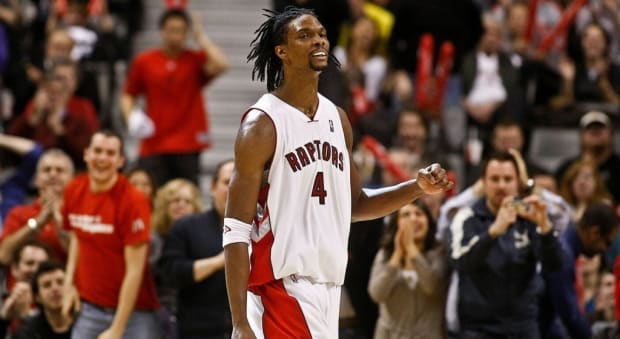
Career Stats (with Raptors): 20.2 PPG, 9.4 RPG, 2.2 APG, 0.8 SPG, 1.2 BPG
Career Achievements (with Raptors): 5x All-Star, 1x All-NBA Team Selection
Give it a few more years and it is Pascal Siakam that is taking this spot over Chris Bosh. For now, Bosh remains the Raptors' best power forward by a slim margin. Chris Bosh was the better version of himself in Toronto, posting ridiculous stat lines and breaking franchise records the more time he spent in Toronto. He is the all-time Raptors leader in blocks and rebounds while also being their all-time leader in defensive win shares.
Bosh was handed some down luck early on with Toronto as the teams built around him were never very good. He was able to lead the Raptors to the playoffs twice in his 7 seasons there and both ended in first-round exits. In his final 5 seasons, Bosh was named to 5 straight All-Star teams and made the only All-NBA Team of his career. Over those 5 years, he averaged 22.8 PPG, 9.9 RPG, and 1.1 BPG.
Utah Jazz - Karl Malone
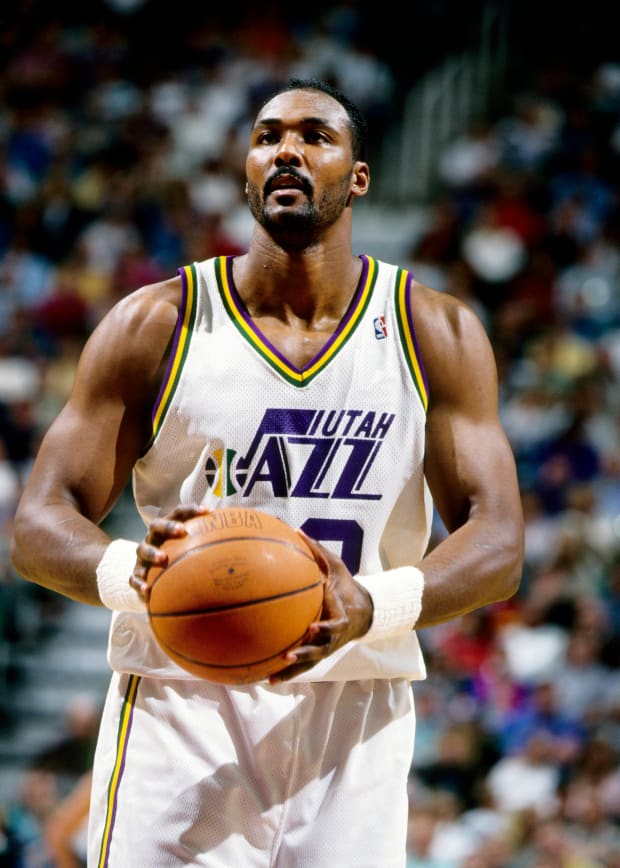
Credit: RVR Photos-USA TODAY Sports
Career Stats (with Jazz): 25.4 PPG, 10.2 RPG, 3.5 APG, 1.4 SPG, 0.8 BPG
Career Achievements (with Jazz): 2x MVP, 14x All-Star, 2x All-Star Game MVP, 14x All-NBA Team Selection, 4x All-Defensive Team Selection
During the 1990s, there was no better power forward in the game than Karl Malone. The man did everything well. He played elite defense against some of the NBA’s toughest competition. On offense, he became one of the league’s best scorers behind a mid-range jump shot that was automatic and an unstoppable array of moves in the post. He also was one of the best transition bigs in the entire league and ran an immaculate pick and roll game with point guard John Stockton.
By the time Karl Malone retired, he had scored the second-most points in NBA history (currently ranks 3rd). From 1988 to 1998, Malone recorded 11 straight seasons of 25.0 PPG or better and had 12 such seasons in his caterer. During that stretch, he averaged 27.1 PPG, 10.9 RPG, and 1.4 SPG on 52.9% shooting. He took home the 1997 MVP behind 27.4 PPG and 9.9 RPG. He led the Jazz to back-to-back Finals appearances in 1997 and 1998 but fell to Michael Jordan and the Bulls both times. He took home another MVP award in 1999 before retiring in 2004. He is still the Jazz's all-time leader in points, rebounds, and field goals made.
Washington Wizards - Elvin Hayes
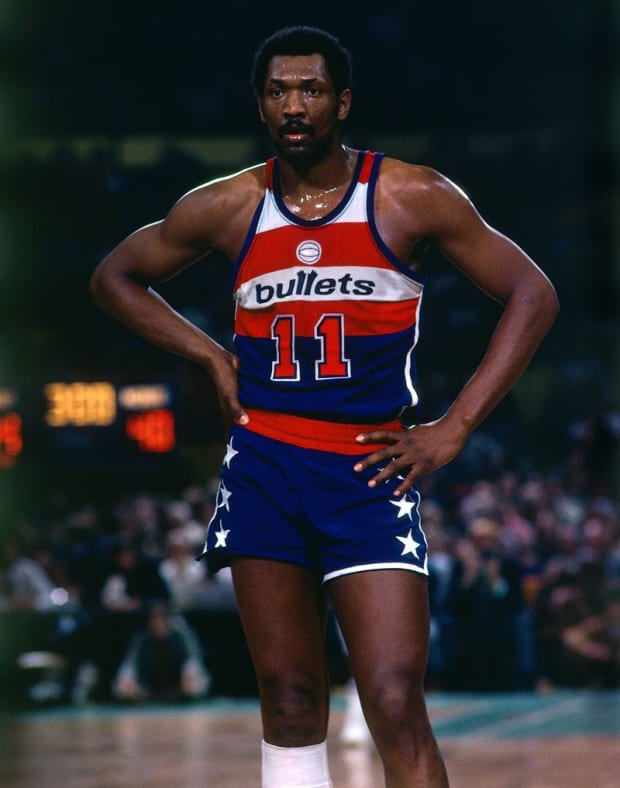
Career Stats (with Wizards): 21.3 PPG, 12.5 RPG, 1.8 APG, 1.1 SPG, 2.4 BPG
Career Achievements (with Wizards): 8x NBA All-Star, 6x All-NBA Team Selection, 2x All-Defensive Team Selection
When Elvin Hayes was traded from the Houston Rockets to the Washington Bullets in 1972, there was a serious question if it was the right move by the Bullets. They had just traded All-Star sharpshooter Jack Marin away for a guy they thought could not fit next to star Wes Unseld. Hayes decided he was going to make things work next to Unseld no matter what it took. Hayes adapted and went on to help the Bullets claim the 1978 NBA title while Marin faltered after one season in Houston.
For his first 7 seasons in Washington, Hayes was one of the premier power forwards in the NBA. Over that stretch, he averaged 21.7 PPG, 13.1 RPG, and 2.4 BPG. He left defenses confused on what to do with him on both ends of the floor and still had to focus some attention on Unseld. In 1978, Hayes and Unseld led the Bullets to their first and only title in franchise history. Hayes averaged 20.7 PPG, 11.9 RPG, and 2.0 BPG to take down Seattle in 7 games. There has never been a better power forward in Washington.
Post a Comment
0 Comments